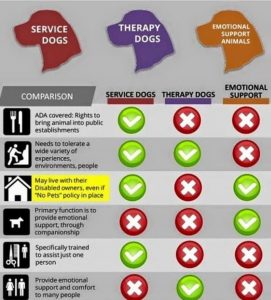 Transitioning to college and dealing with the stresses of college life can be challenging. In certain situations, students are allowed to have emotional support animals (ESA) in their on-campus housing to help them have an equal opportunity to fully participate in and benefit from all aspects of the college experience. Students who have a documented disability can register with the Counseling Center and Disability Services Office through Cobbernet to have their ESA on campus.
Transitioning to college and dealing with the stresses of college life can be challenging. In certain situations, students are allowed to have emotional support animals (ESA) in their on-campus housing to help them have an equal opportunity to fully participate in and benefit from all aspects of the college experience. Students who have a documented disability can register with the Counseling Center and Disability Services Office through Cobbernet to have their ESA on campus.
An emotional support animal is an animal that helps an individual with a disability, such as providing companionship and support that helps alleviate aspects of a disability.
Getting approved for an ESA on campus is fairly simple. Matthew Rutten, director of the Counseling Center and Disability Services, explains the process.
“Students requesting an ESA will need to state their intentions through the completion of the ESA Request Student Form. They will also need to have their provider(s) complete the ESA Request Provider Form. In addition, the Office of Residence Life has its own procedures for documenting vaccines and other types of necessary information to assure campus safety,” he said.
Mikal Kenfield, the director of Residence Life, detailed how she and Rutten work together to determine animal approval.
“The things Matt and I both consider when we’re trying to figure out if the animal should be ’approved’ is meeting the needs of the student, and what the needs and rights of the community are. We don’t want to infringe on either’s rights and that’s where there can be tension.”
An example of this issue could be allergies to or fear of animals. Unless they pose a health or safety concern, most animals are allowed. The most common ESAs are cats and dogs.
“We see cats more frequently,” Kenfield said. “Students understand that a cat can do okay in a residence hall or apartment.”
However, not all animals are allowed. Kenfield describes that it is case-by-case.
“There is not a list that says ‘these animals are allowed and these aren’t; it’s determined case-by-case. Emotional support animals are approved for your living environment only; they are actually more of a housing accommodation,” she said.
Rutten agrees, explaining that as a result, that if the student leaves campus, the ESA must go with them.
He added that “The college could deny an ESA in several instances. The most common is incomplete paperwork or a student could simply not demonstrate a need for an ESA.”
As of the present, there has never been an issue on campus with students bringing an ESA.
Fjelstad Resident Assistant, AJ Jennissen, said “I think ESAs are extremely helpful on campus. They provide an extra outlet for students who need it. College is a very high-stress environment and that can affect everyone. I think it’s an important resource for students to be able to have.”
Some schools have become pet-friendly, such as Caltech, MIT, and Notre Dame. Concordia does not allow animals, with the exception of fish in tanks no larger than 10 gallons, service animals, therapy animals, and emotional support animals. More information on animal policies can be found in the Residence Hall Handbook.
“Service animals are governed under the Americans with Disabilities Act, and ESAs under the Fair Housing Act. The laws are distinct from one another, as are the purposes of the animals,” Rutten said.
The Americans with Disabilities Act defines a service animal as a dog that has innate abilities or has been trained to perform tasks for an individual with a disability. Therapy animals are trained and responsible to provide psychological or physiological therapy to people other than their handlers, as compared to an emotional support animal, which provides comfort by being with their handler and may not have any specific training.
If you feel having an ESA in your on-campus housing would be beneficial to you, reach out to the Counseling Center and Disability Services. Their office is located in Academy 106, otherwise they can be reached at 218-299-3514 or counseling@cord.edu.

